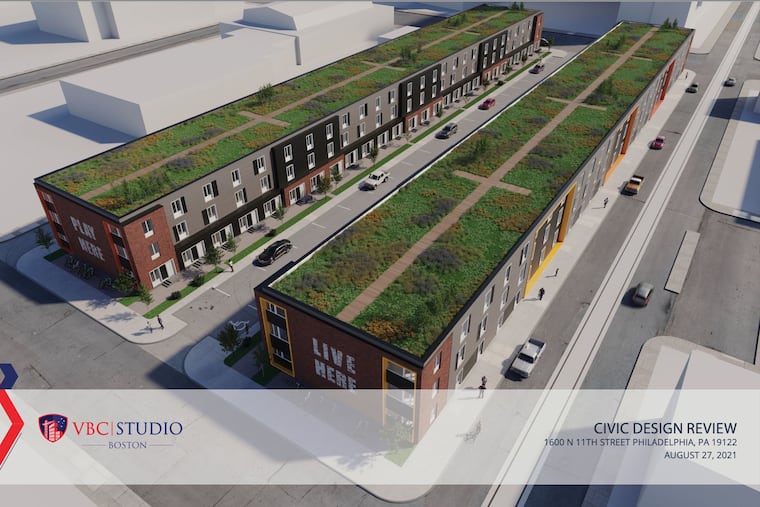For a second time, Civic Design Review panel votes ‘disappointment’ in apartments proposed for Temple students
For a second time, the Civic Design Review told a developer of a proposed student apartment complex near Temple that its plans are "disappointing" and don't fit in either with Temple or the community

The first time developers of a proposed 320-unit apartment complex near Temple University went before the city’s Civic Design Review, one panel member said: “This is a sad project. . . . If I woke up here, I would think I’d been kidnapped.”
That is what Dan Garofalo, vice chair of the advisory panel, said at the Dec. 7 meeting about the proposed apartments planned for a 2.5-acre site at 1600 N. 11th St., next to Bright Hope Baptist Church in North Philadelphia.
On Tuesday, the developer, 1600 N. 11th Street CRCP LLC, and the architectural firm, VBC Studio, of Boston, made a second appearance before the panel via Zoom.
The developer presented new plans for the primarily studio apartments, designed as private off-campus housing for Temple students. At one community meeting, residents said they were told the apartments would be market rate and cost about $1,300 a month, the Philadelphia Tribune reported in November.
But not much was changed in the new plans, the panel said.
VBC Studio lead architect Sara-Ann Logan said she added benches and plantings on the 11th Street side as a way to better address the panel’s concerns that the design was disconnected from the community.
She said the two long strips of apartments — that one public commenter described as looking like “shipping containers” in December — had been shifted to the north to created a larger buffer between the apartments and the community.
On Wednesday, Michael Johns, an architect who is chair of the panel, summed up the vote to recommend against the design this way:
“It was a vote of displeasure in the plan. We were dissatisfied with the plan. We felt that, at the end of the day, it was not a project that will enhance the public realm.”
Civic Design Review is an advisory panel
City planner Ian Litwan, who gave a staff report on the resubmitted plans, said the project still does not fit well with Temple University’s architectural scheme to the north, nor with that of the Yorktown and Jefferson Manor residential neighborhoods to the south and east.
Litwan noted that the advisory panel had suggested in December that having two trash dumpsters in the street was “unacceptable.” In the new plans, he said, “the trash is still stored outside.”
Garofalo, an architect and senior adviser at Econsult Solutions Inc., said during the hearing, “I’m extremely disappointed.”
He said that too often, in some neighborhoods where there is “poverty and struggle, we are failing to see the level of design and commitment the community deserves.”
Johns had pointed out that the trash storage on the street would encourage short dumping.
“It’s very unfortunate, leaving outdoor trash storage was an easy fix, and to me that was a total disregard for the public realm,” he said.
But Johns said the Civic Design Review panel can only make recommendations to the City Planning Commission.
Its reports are submitted to the commission and to the city’s Department of Licenses and Inspections. The next step is for L&I to either approve or reject the developer’s application for a zoning variance for the project.
Community voices
Most members of the public who spoke Tuesday opposed the new design.
Faye Anderson, a preservationist and public historian, raised environmental concerns because a commercial laundry and auto repair shop once occupied the site.
In an interview Wednesday, she added: “We still don’t know whether the land is contaminated. L&I records do not show the required soil testing has been done.”
Michael Mattioni, a lawyer for the developer, told the panel on Tuesday that all underground storage tanks were removed in June. He did not return a call for further comment.
» READ MORE: Civic Design panel tells developer of student housing near Temple University: Go back to the drawing board
David Sims, a city planning student at Temple, said he understood that the consensus from the December meeting was “to scrap it [the original design] and start over. Unfortunately, the developer has misunderstood the advisory board and the updated design is underwhelming.”
Paula Peebles, an activist and chair of the Pennsylvania National Action Network who lives in Jefferson Manor, said: “It does not meet the design requirements. We are already overwhelmed with issues of Temple University and trash and disrespect.”
William Mackey, executive director of the nonprofit Men for Positive Change, was the only member of the public who spoke in favor of the apartments.
“We support this effort that the developer put into the community,” Mackey said.
Mackey, once executive director of the private nonprofit City Wide Youth Leadership Agency, said Men For Positive Change is not located in Yorktown. It is based at a community center at 1410 N. 16th St., in the Franklinville neighborhood, nearly a mile from the proposed apartment project.
After the hearing, Peebles said the neighborhood does not need more student housing.
“We need affordable houses for moderate-income and middle-class people. Our children and grandchildren want to buy houses and stay in this community. We told the city [officials] that, but they are just so disrespectful.”